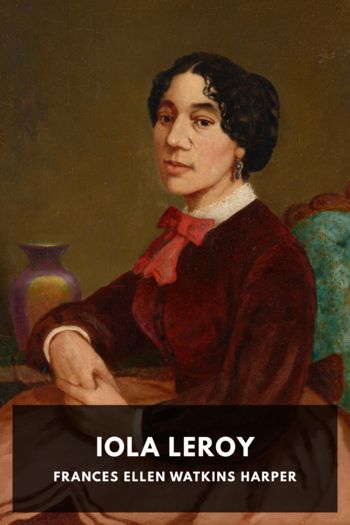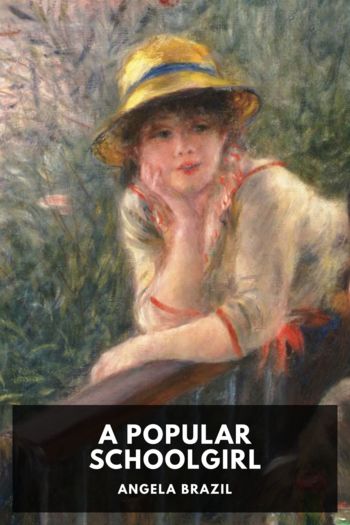Iola Leroy, Frances Ellen Watkins Harper [read aloud books .txt] 📗

- Author: Frances Ellen Watkins Harper
Book online «Iola Leroy, Frances Ellen Watkins Harper [read aloud books .txt] 📗». Author Frances Ellen Watkins Harper
“What did Gundover say?” asked Captain Sybil.
“He turned pale, and said, ‘For God’s sake don’t speak of the Day of Judgment in connection with slavery.’ ”
Just then a messenger brought a communication to Captain Sybil. He read it attentively, and, turning to Robert, said, “Here are orders for an engagement at Five Forks tomorrow. Oh, this wasting of life and scattering of treasure might have been saved had we only been wiser. But the time is passing. Look after your company, and see that everything is in readiness as soon as possible.”
Carefully Robert superintended the arrangements for the coming battle of a strife which for years had thrown its crimson shadows over the land. The Rebels fought with a valor worthy of a better cause. The disaster of Bull Run had been retrieved. Sherman had made his famous march to the sea. Fighting Joe Hooker had scaled the stronghold of the storm king and won a victory in the palace chamber of the clouds; the Union soldiers had captured Columbia, replanted the Stars and Stripes in Charleston, and changed that old sepulchre of slavery into the cradle of a newborn freedom. Farragut had been as triumphant on water as the other generals had been victorious on land, and New Orleans had been wrenched from the hands of the Confederacy. The Rebel leaders were obstinate. Misguided hordes had followed them to defeat and death. Grant was firm and determined to fight it out if it took all summer. The closing battles were fought with desperate courage and firm resistance, but at last the South was forced to succumb. On the ninth day of April, 1865, General Lee surrendered to General Grant. The lost cause went down in blood and tears, and on the brows of a ransomed people God poured the chrism of a new era, and they stood a race newly anointed with freedom.
XVI After the BattleVery sad and heartrending were the scenes with which Iola came in constant contact. Well may Christian men and women labor and pray for the time when nations shall learn war no more; when, instead of bloody conflicts, there shall be peaceful arbitration. The battle in which Robert fought, after his last conversation with Captain Sybil, was one of the decisive struggles of the closing conflict. The mills of doom and fate had ground out a fearful grist of agony and death,
“And lives of men and souls of States
Were thrown like chaff beyond the gates.”
Numbers were taken prisoners. Pale, young corpses strewed the earth; manhood was stricken down in the flush of its energy and prime. The ambulances brought in the wounded and dying. Captain Sybil laid down his life on the altar of freedom. His prediction was fulfilled. Robert was brought into the hospital, wounded, but not dangerously. Iola remembered him as being the friend of Tom Anderson, and her heart was drawn instinctively towards him. For awhile he was delirious, but her presence had a soothing effect upon him. He sometimes imagined that she was his mother, and he would tell her how he had missed her; and then at times he would call her sister. Iola, tender and compassionate, humored his fancies, and would sing to him in low, sweet tones some of the hymns she had learned in her old home in Mississippi. One day she sang a few verses of the hymn beginning with the words—
“Drooping souls no longer grieve,
Heaven is propitious;
If on Christ you do believe,
You will find Him precious.”
“That,” said he, looking earnestly into Iola’s face, “was my mother’s hymn. I have not heard it for years. Where did you learn it?”
Iola gazed inquiringly upon the face of her patient, and saw, by his clear gaze and the expression of his face, that his reason had returned.
“In my home, in Mississippi, from my own dear mother,” was Iola’s reply.
“Do you know where she learned it?” asked Robert.
“When she was a little girl she heard her mother sing it. Years after, a Methodist preacher came to our house, sang this hymn, and left the book behind him. My father was a Catholic, but my mother never went to any church. I did not understand it then, but I do now. We used to sing together, and read the Bible when we were alone.”
“Do you remember where she came from, and who was her mother?” asked Robert, anxiously.
“My dear friend, you must be quiet. The fever has left you, but I will not answer for the consequences if you get excited.”
Robert lay quiet and thoughtful for awhile and, seeing he was wakeful, Iola said, “Have you any friends to whom you would like to send a letter?”
A pathetic expression flitted over his face, as he sadly replied, “I haven’t, to my knowledge, a single relation in the world. When I was about ten years old my mother and sister were sold from me. It is more than twenty years since I have heard from them. But that hymn which you were singing reminded me so much of my mother! She used to sing it when I was a child. Please sing it again.”
Iola’s voice rose soft and clear by his bedside, till he fell into a quiet slumber. She remembered that her mother had spoken of her brother before they had parted, and her interest and curiosity were awakened by Robert’s story. While he slept, she closely scrutinized Robert’s features, and detected a striking resemblance between him and her mother.
“Oh,





Comments (0)